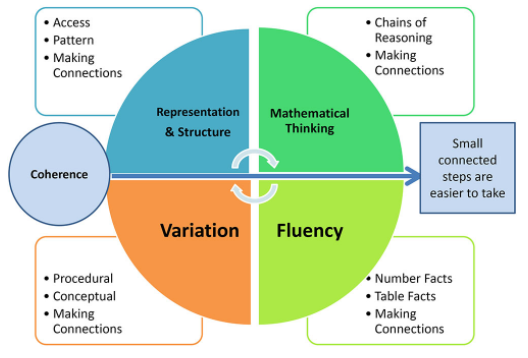Maths
Intent
At Pinhoe C of E Primary School, we want to develop curious, skilful, confident and reflective Mathematicians. Learning and Teaching in Maths is developed following the three core areas of Mathematic Mastery: fluency, reasoning and problem solving. We teach to enable learners to become fluent in the fundamentals of mathematics, reason mathematically by making connections and developing language to provide justification and solve problems by applying their mathematical skills. Our mastery approach encourages children to think creatively, take risks, collaborate, question and rise to challenges in order to acquire a deep, long-lasting and secure understanding of Mathematical concepts.
Implementation
Maths is taught every day for a minimum of 45 minutes in KS1 and one hour in KS2. Our mastery approach underpins lessons, which facilitate children to take small but progressive steps in order to build deep and coherent understanding of concepts.
Typically, these steps begin with a concrete exploration of a Mathematical concept, using resources and manipulatives to provide a hands-on, real experience. Children then develop an understanding of concept through pictorial representations, which may include using illustrations, bar modelling and visual models of concrete resources. Finally, children will leap into exploring ‘abstract’ numerical representations of a concept. However, learners are encouraged to revisit and use concrete and pictorial representations throughout their journey – even once they are confident with abstract methods – as this can help them to develop, explain their reasoning and solve challenging problems.
At Pinhoe, we believe that having a confident grasp of number concepts provides the foundations for developing a deeper understanding. Therefore, we focus on developing the number skills needed for new concepts within the ‘fluency’ part of our lessons. Following this, children are encouraged to solve problems and reason and conject in order to explain their understanding and take ‘deeper dives’ into their learning. Skilful questioning, collaborative discussion, the use of Maths Talk and developing Working Walls enables learners to explore in an immersive, shared and supportive environment. Overall, children are led to make connections between concepts in Maths, fuelling reflection, understanding and confidence.

Teachers use the White Rose Maths Schemes of Learning to plan a series of lessons and ensure progression in learning, consistency and coverage. These schemes are supplemented by other resources, including ‘Fluent in 5’, ‘I See Reasoning’ and ‘Nrich Investigations’. Pupils’ learning in Maths is further enhanced by the use of virtual learning platforms, including ‘TTRS’ and ‘Numbots’. Maths books will be marked/looked at by the teacher daily and children will respond to feedback where appropriate and necessary. All children will participate in a guided session each week and be encouraged to use resources daily to support understanding.
Impact
Children will be excited by Maths and engaged in lessons. They will be curious and resilient learners, equipped with the Maths skills they need for everyday life and will be prepared to take next steps in their learning journey.
In lessons, children will be engaged, motivated and not afraid to take risks. Their books will illustrate their learning journey and will also be a tool they can use to be reflective and revisit concepts they have learned. We strive to encourage children to believe in their abilities and be the best that they can be. At Pinhoe, every child can celebrate achievement in Maths.
Calculation policy
Progression of Skills
Maths Key VocabularySkills Progression Maths
Overview
Useful Links
TTRS
https://whiterosemaths.com/parent-resources

 Cedar Tree
Federation
Cedar Tree
Federation